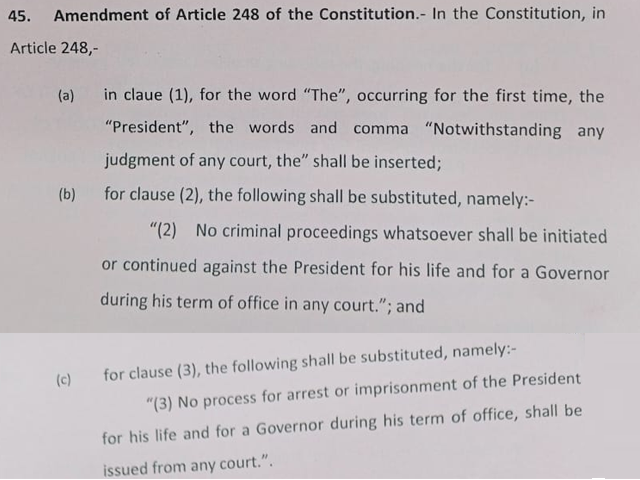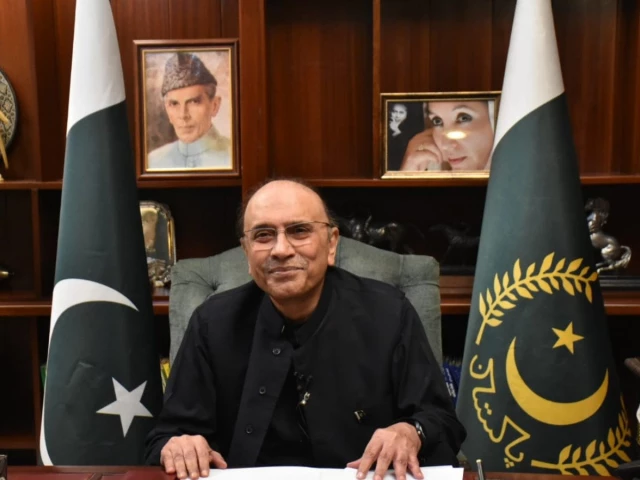Amendment proposes new post of Chief of Defence Forces, replacing office of Chairman Joint Chiefs of Staff Committee
President Asif Ali Zardari. Photo: File
On the demand of the Pakistan Peoples Party, the draft of the proposed 27th Constitutional Amendment includes a provision granting the president lifetime immunity from prosecution and arrest, ensuring that no case can be filed against the president during or after their tenure.
Sources said the clause was added following a demand by the Pakistan Peoples Party (PPP) during deliberations in the joint parliamentary committee on Saturday.
A new clause has been added to Article 248 of the Constitution, which is being amended to grant the president lifetime legal immunity, expanding the protection that currently applies only during the term of office.

At present, Article 248 grants complete legal protection to the president and governors during their tenure, barring the initiation or continuation of criminal proceedings against them and preventing any court from issuing orders for their arrest or imprisonment while they hold office.
Under the proposed amendment, however, this protection will remain permanent in the case of the president, while governors will continue to enjoy immunity only for the duration of their term in office.
The amendment seeks to insert the phrase “Notwithstanding any judgment of any court,” before the word “President” in clause (1) of Article 248. Meanwhile, clause (2) will be revised to state that no criminal proceedings shall be initiated or continued against the president for life, and against a governor only during their term.
Similarly, clause (3) will be amended to specify that no court shall issue orders for the arrest or imprisonment of the president for life, whereas such protection for governors will remain limited to their period in office.
Earlier, the federal government moved a significant constitutional reform package to the upper house as the proposed 27th Amendment Bill was formally presented in the Senate, following approval from the federal cabinet. The bill seeks to introduce major structural changes to Pakistan’s military command framework and judicial system.
Under the proposal, a new post titled Chief of the Defence Forces would be created, effectively replacing the office of the Chairman Joint Chiefs of Staff Committee. The amendment outlines a revised chain of command by altering Article 243, which deals with the control and command of the armed forces.
Read: 27th Constitutional Amendment tabled in Senate, referred to joint committee
The bill also proposes the establishment of a Federal Constitutional Court mandated to adjudicate constitutional disputes and provide authoritative interpretation of constitutional questions. For this purpose, a separate new chapter would be inserted into Part VII of the Constitution.
In addition, the amendment seeks notable changes to Article 175A, which currently governs the appointment of judges to superior courts. The proposed modifications are aimed at reshaping the process of judicial appointments in line with the new constitutional court framework.
Restructuring of military command
Under the bill, Article 243 is amended to consolidate command of the armed forces under a single authority. The proposed clause states that the president, acting on the advice of the prime minister, will appoint the Chief of the Army Staff ‘concurrently the Chief of the Defence Forces’, along with the Chiefs of the Navy and Air Staff, and determine their ‘salaries and allowances’.
The bill provides that the office of Chairman Joint Chiefs of Staff Committee will stand abolished from November 27, 2025. Strategic military authority would instead be concentrated under the new Chief of the Defence Forces.
Clause (5) provides that “The office of the Chairman, Joint Chiefs of Staff Committee shall stand abolished with effect from the twenty-seventh day of November two thousand and twenty-five.”
Additional clauses outline a revised appointment structure for senior command. The prime minister, on the recommendation of the Chief of the Army Staff concurrently the Chief of the Defence Forces, will appoint the Commander of the National Strategic Command, with salaries and allowances determined by the prime minister.
Read More: From Bhutto to today: 52 years, 26 amendments, evolving Pakistan’s Constitution
As per clause (7), “Where the Federal Government promotes a member of the Armed Forces to the rank of Field Marshal, Marshal of the Air Force or Admiral of the Fleet, such officer shall retain the rank, privileges and remain in uniform for life,” it added.
These officers are granted constitutional protection and may not be removed except through the procedure outlined under Article 47. The immunity available to the president under Article 248 is also made applicable to them.
Further provisions state that after completion of their command, the federal government will determine their responsibilities ‘in the interest of the state’, and the president, on the advice of the prime minister, will set their salaries and privileges.
Transfer of High Court judges
The bill also amends Article 200, empowering the president to transfer High Court judges between provinces based on the recommendation of the Judicial Commission of Pakistan, which, for this purpose, will include the Chief Justices of both High Courts concerned.
The amendment adds that “the Chief Justices of both High Courts shall also be members of the Judicial Commission of Pakistan for the purposes of this clause.”
The amendment further provides that a transferred judge’s seniority will be counted from the date of initial appointment and specifies that no transfer may result in a judge becoming senior to the Chief Justice of the transferee High Court.
A new clause states that a judge who does not accept the transfer ‘shall be deemed to have retired’.
Federal Constitutional Court proposed
A major structural change comes through the creation of a Federal Constitutional Court, introduced via a new Chapter under Part VII of the Constitution. The Court will consist of a Chief Justice and a number of judges determined by the Parliament, or until then, fixed by the president. It may include an equal number of judges from each province.
The proposed Article on constitution of the court states, “The Federal Constitutional Court shall consist of a Chief Justice to be known as the Chief Justice of the Federal Constitutional Court of Pakistan, and so, many other judges as may be determined by Act of Majlis-e-Shoora (Parliament) or, until so determined, as may be fixed by the president.” Further, “The Federal Constitutional Court may have equal number of Judges from each province.”
Also Read: PPP yet to take position on dual nationality proposal: Bilawal
The court will hold original jurisdiction in constitutional disputes between governments and may also hear matters relating to enforcement of fundamental rights. Its judgments will be declaratory.
A transitional clause states that all petitions, appeals, or review applications currently pending before the Supreme Court or its constitutional benches that fall under this jurisdiction will be transferred to the Federal Constitutional Court.
Judges of the court will serve until the age of sixty-eight, while the Chief Justice will hold office for a three-year term, retiring upon completion of the term regardless of age.
Changes to judicial appointments
To accommodate the new court, the bill amends Article 175A, expanding the composition of the Judicial Commission of Pakistan to include the Chief Justice of the Federal Constitutional Court, the Chief Justice of the Supreme Court, senior judges of both courts, and an additional judge jointly nominated by both chief justices. The senior of the two chief justices will chair the Commission.
“The senior amongst the Chief Justice of the Federal Constitutional Court and the Chief Justice of the Supreme Court shall be the Chairperson of the Commission,” with their inter se seniority determined by the date of appointment,” it added.
Transitional arrangements allow the president, on advice of the prime minister, to appoint the first Chief Justice and initial judges of the Federal Constitutional Court.
Amendment also seeks -reaching changes including the abolition of suo motu powers, the deletion of Article 184 from the Constitution, and the removal of Articles 186 and 191A.
Read: Judges quip over site of new court
The proposed clause, stated that “in the Constitution, Article 184 shall be omitted,” effectively abolishes the Supreme Court’s long-standing original jurisdiction, which had empowered it to hear cases of public importance concerning the enforcement of fundamental rights.
This omission signifies a structural shift, transferring such constitutional jurisdiction to the newly established Federal Constitutional Court as envisaged in the amendment.
The bill further declares that “in the Constitution, Article 186 shall be omitted.” This removes the president’s power to refer questions of law to the Supreme Court for advisory opinion, a power that had existed since the Constitution’s inception in 1973. Its omission confines the Supreme Court’s function strictly to adjudicatory matters.

